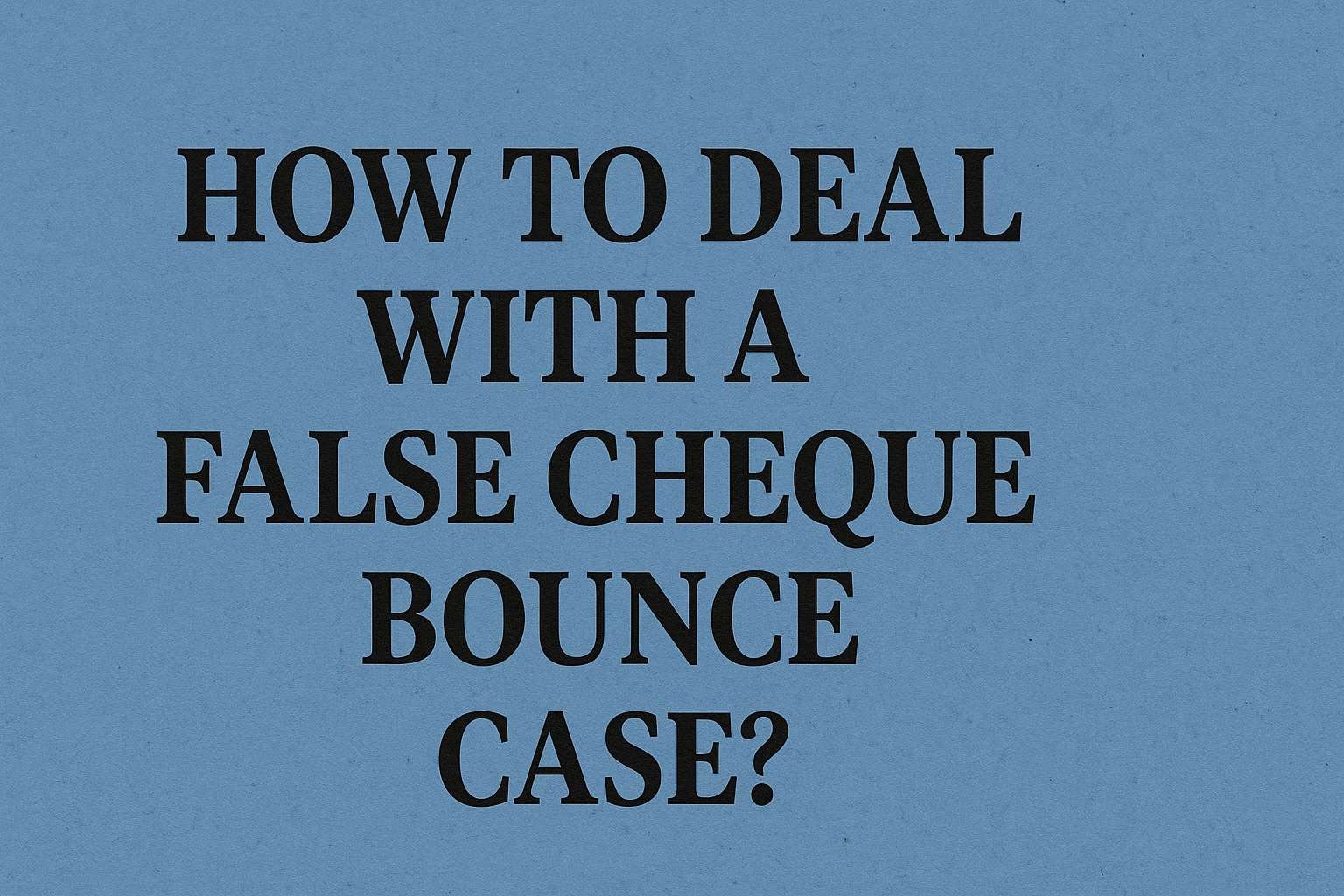On this page you will read detailed information about How to deal with a False Cheque Bounce Case?
Introduction
A cheque bounce case is one of the most common financial disputes under Indian law. But what happens when someone files a false cheque bounce case against you—without valid reason, or out of malice?
With digital banking on the rise and paper cheques still used in business, Section 138 of the Negotiable Instruments Act, 1881 (NI Act) continues to be a vital law. However, misuse of this provision has also become common. Individuals and companies sometimes file false cases to harass, intimidate, or recover unrelated debts, misusing the law’s summary-criminal nature.
This guide explains what a false cheque-bounce case is, your legal rights, and how to defend yourself effectively under the latest legal standards (2025).
What Is a Cheque Bounce Case?
A cheque “bounces” when the bank refuses to honour it due to:
- insufficient funds,
- mismatch in signature,
- account closure,
- payment stopped by drawer, or
- any reason preventing clearance.
Under Section 138 of the Negotiable Instruments Act, a cheque bounce becomes a criminal offence when:
- The cheque was issued to discharge a legally enforceable debt or liability.
- The cheque was presented within 3 months (or validity period).
- The payee issued a demand notice within 30 days of bank return.
- The drawer failed to pay within 15 days of receiving that notice.
If these conditions are met, the payee can file a criminal complaint in court.
What Is a False Cheque Bounce Case?
A false or frivolous cheque-bounce case is one where the complainant misuses Section 138 even though:
- No debt or legal liability existed;
- The cheque was issued as security, not payment;
- The cheque was misplaced or stolen and misused;
- The debt was already settled or cheque given under coercion;
- The complainant forged or altered the cheque.
Courts increasingly recognize that Section 138 is sometimes abused to pressure accused persons into settlement.
Legal Position in 2025
Recent Judicial Approach
Recent judgments reaffirm key safeguards:
- “Legally Enforceable Debt” Is Essential:
The Supreme Court has repeatedly held (e.g., Basalingappa v. Mudibasappa, 2019 SCC Online SC 491; reaffirmed 2023) that presumption under Section 139 (that a cheque is for debt/liability) is rebuttable. The accused can disprove liability with circumstantial evidence. - Security Cheques Are Not Automatically Liable:
In Indus Airways Pvt. Ltd. v. Magnum Aviation (2020 SC), it was clarified that cheques issued as security or advance payment cannot attract Section 138 unless an enforceable debt existed on the date of issuance. - Cross-Examination Rights Strengthened:
High Courts have directed magistrates to allow fair cross-examination of complainants even in summary trials, protecting innocent accused. - Digital Evidence Accepted:
As per 2023 amendments to the NI Act’s e-process guidelines, email notice acknowledgments and WhatsApp delivery reports can constitute valid proof of service of notice.
Step-by-Step: How to Defend Yourself in a False Case
1. Collect All Documents and Evidence
Gather:
- Bank statement showing transaction history;
- Cheque-book counterfoil and copy of cheque;
- Proof of purpose (e.g., if cheque was given as security or advance);
- Proof of settlement or payment (if any);
- All correspondence (emails, WhatsApp, SMS) showing there was no debt or it was already repaid.
This evidence helps rebut the statutory presumption under Section 139 that the cheque was issued for a lawful debt.
2. File a Detailed Reply to the Demand Notice
If you receive a Section 138 notice, respond within the 15-day period:
- State clearly that there was no debt or liability.
- Attach copies of relevant evidence.
- Maintain polite, factual language—your reply may be crucial in court.
If you genuinely owe nothing, do not pay merely to avoid litigation—record your defence early and formally.
3. Check the Validity of the Complaint
Verify:
- Was the cheque presented within 3 months?
- Was the legal notice issued within 30 days?
- Did you actually receive the notice?
Any lapse in these timelines makes the complaint invalid. You can raise this preliminary objection before the magistrate.
4. Engage an Experienced Criminal/NI Act Lawyer
A professional familiar with cheque-bounce jurisprudence will:
- File your Vakalatnama and bail application (since Section 138 is bailable).
- Draft your plea of defence, highlighting absence of enforceable debt.
- Cross-examine the complainant effectively to show inconsistencies.
You can also move for quashing under Section 482 CrPC if the complaint is patently baseless.
5. Rebut the Presumption under Section 139
While the law presumes liability once a cheque is issued, this is not absolute. You can rebut it by showing:
- The cheque was issued as security;
- The amount differs from the actual debt;
- There was no consideration (no goods/services received);
- Payment was already made by other means;
- The cheque was misused or obtained under duress/fraud.
Evidence such as prior payment receipts, account entries, and communication records are key.
6. File a Counter-Complaint (If Malicious Intent Is Proven)
If you can prove deliberate misuse, you may initiate:
- Defamation (Sections 499-500 IPC) – for damage to reputation;
- Criminal intimidation (Section 506 IPC) – if threats were made;
- Extortion or forgery charges if the cheque was manipulated;
- Civil suit for damages for harassment or wrongful litigation.
This sends a strong message and may also aid in settlement negotiations.
In the previous post, we had shared information about The Legality of Wagering Contracts in Contract Law, so read that post also.
7. Apply for Discharge or Quashing
High Courts have power to quash frivolous cheque-bounce proceedings under Section 482 CrPC if:
- The complaint discloses no legal debt;
- Statutory requirements are not met;
- Documentary proof disproves liability.
Courts prefer not to waste judicial time on obviously false cases. Supporting documents and a concise affidavit improve your chances.
8. Seek Compounding or Mediation
Even in false cases, courts encourage amicable resolution. Under Section 147 of the NI Act, offences are compoundable.
If the complainant realizes the weakness of their claim, you can negotiate withdrawal or settlement through court-annexed mediation centres. This avoids prolonged litigation.
Common Mistakes to Avoid
- Ignoring the legal notice — Silence is construed as admission. Always reply.
- Missing court summons — Non-appearance can lead to a bailable warrant.
- Destroying evidence — Keep originals safely; they prove your innocence.
- Informal cash settlements — Always document any repayment or agreement.
- Relying on verbal assurance — Record everything in writing or email.
How Long Does a Cheque-Bounce Case Take?
With judicial reforms and e-courts rollout, most Section 138 cases are now targeted for disposal within 12–18 months (as per 2023 Supreme Court directives). Still, delays may occur due to procedural issues or witness unavailability. Using mediation or compounding can significantly shorten the process.
Preventive Measures to Avoid Future False Cases
- Avoid issuing blank or open cheques.
- Mark cheques “security” or “non-negotiable” if not meant for payment.
- Keep written contracts for every transaction involving cheques.
- Use digital payment receipts to establish records.
- Regularly reconcile bank accounts to detect misuse early.
These proactive steps reduce the risk of wrongful accusations.
Conclusion
A false cheque-bounce case can be stressful, but Indian law provides strong safeguards for the innocent. The Negotiable Instruments Act demands that a “legally enforceable debt” exist for prosecution under Section 138. If you have evidence that no such debt exists—or that the cheque was issued only as security—you can successfully defend yourself.
Remember to act quickly: reply to notices, engage a competent lawyer, gather documents, and present your defence clearly. Courts today are aware of the misuse of Section 138 and often side with the accused when fraud or malice is evident.
The best defence is preparation and documentation. By maintaining proper records, using cheques responsibly, and asserting your rights confidently, you can protect yourself from harassment and ensure justice prevails.
Disclaimer
The information and services on this website are not intended to and shall not be used as legal advice. You should consult a Legal Professional for any legal or solicited advice. While we have good faith and our own independent research to every information listed on the website and do our best to ensure that the data provided is accurate. However, we do not guarantee the information provided is accurate and make no representation or warranty of any kind, express or implied, regarding the accuracy, adequacy, validity, reliability, availability, or completeness of any information on the Site. UNDER NO CIRCUMSTANCES SHALL WE HAVE ANY LIABILITY TO YOU FOR ANY LOSS OR DAMAGE OF ANY KIND INCURRED AS A RESULT OR RELIANCE ON ANY INFORMATION PROVIDED ON THE SITE. YOUR USE OF THE SITE AND YOUR RELIANCE ON ANY INFORMATION ON THE SITE IS SOLELY AT YOUR OWN RISK. Comments on this website are the sole responsibility of their writers so the accuracy, completeness, veracity, honesty, factuality and politeness of comments are not guaranteed.
So friends, today we talked about How to deal with a False Cheque Bounce Case?, hope you liked our post.
If you liked the information about How to deal with a False Cheque Bounce Case?, then definitely share this article with your friends.
Knowing about laws can make you feel super smart ! If you find value in the content you may consider joining our not for profit Legal Community ! You can ask unlimited questions on WhatsApp and get answers. You can DM or send your name & number to 8208309918 on WhatsApp







